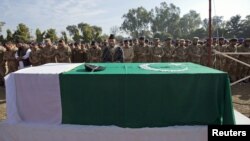Pakistan has lodged a strong protest against what it said are repeated, unacceptable and unprovoked attacks on Pakistani soldiers by the Indian army.
Pakistani Foreign Secretary Jalil Abbas Jilani summoned India's high commissioner Sharat Sabharwal on Friday and asked that the Indian government thoroughly investigate "repeated violations of the ceasefire" in the disputed Himalayan region of Kashmir and take steps to "ensure their non-recurrence."
There have been three separate clashes along the de facto border this week, with the latest incident taking place on Thursday.
Pakistan's military says a Pakistani soldier was killed by "unprovoked firing" on a Pakistani military post in the Hotspring sector. A military spokesman, Major-General Asim Saleem Bajwa, said Thursday's attack was the10th ceasefire violation by India so far this year.
An Indian external affairs ministry spokesman, Syed Akbaruddin, told reporters in New Delhi Friday that Indian troops in the Mendhar sector responded in a "controlled" way to unprovoked firing from the Pakistani side.
On Tuesday, India accused Pakistani troops of killing two Indian soldiers in a cross-border attack. Indian officials said the bodies of the two soldiers were subject to "barbaric and inhuman mutilation," and that one of them was beheaded. On Sunday, Pakistan claimed Indian troops crossed the border and raided a Pakistani military post, killing a Pakistani soldier."
The clashes between the nuclear-armed neighbors are the worst outbreak of violence in Kashmir since a cease-fire took effect in 2003. But Pakistani Foreign Minister Hina Rabbani Khar said Thursday, shortly before the latest alleged shooting incident, that she does not believe the violence will derail the ongoing bilateral peace process.
Pakistan's Foreign Office on Friday said "such unprovoked attacks" are against the spirit of the ongoing peace process and create "unnecessary and unavoidable distractions" in peace efforts. Pakistan also said it has pursued dialogue with India "with seriousness" and taken "significant steps" to create a peaceful environment.
The South Asian neighbors have fought two wars over Kashmir since gaining independence from Britain in 1947. India and Pakistan both claim the region in full.
Pakistani Foreign Secretary Jalil Abbas Jilani summoned India's high commissioner Sharat Sabharwal on Friday and asked that the Indian government thoroughly investigate "repeated violations of the ceasefire" in the disputed Himalayan region of Kashmir and take steps to "ensure their non-recurrence."
There have been three separate clashes along the de facto border this week, with the latest incident taking place on Thursday.
Pakistan's military says a Pakistani soldier was killed by "unprovoked firing" on a Pakistani military post in the Hotspring sector. A military spokesman, Major-General Asim Saleem Bajwa, said Thursday's attack was the10th ceasefire violation by India so far this year.
An Indian external affairs ministry spokesman, Syed Akbaruddin, told reporters in New Delhi Friday that Indian troops in the Mendhar sector responded in a "controlled" way to unprovoked firing from the Pakistani side.
On Tuesday, India accused Pakistani troops of killing two Indian soldiers in a cross-border attack. Indian officials said the bodies of the two soldiers were subject to "barbaric and inhuman mutilation," and that one of them was beheaded. On Sunday, Pakistan claimed Indian troops crossed the border and raided a Pakistani military post, killing a Pakistani soldier."
The clashes between the nuclear-armed neighbors are the worst outbreak of violence in Kashmir since a cease-fire took effect in 2003. But Pakistani Foreign Minister Hina Rabbani Khar said Thursday, shortly before the latest alleged shooting incident, that she does not believe the violence will derail the ongoing bilateral peace process.
Pakistan's Foreign Office on Friday said "such unprovoked attacks" are against the spirit of the ongoing peace process and create "unnecessary and unavoidable distractions" in peace efforts. Pakistan also said it has pursued dialogue with India "with seriousness" and taken "significant steps" to create a peaceful environment.
The South Asian neighbors have fought two wars over Kashmir since gaining independence from Britain in 1947. India and Pakistan both claim the region in full.





